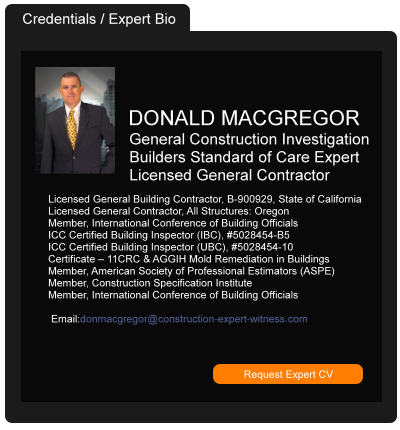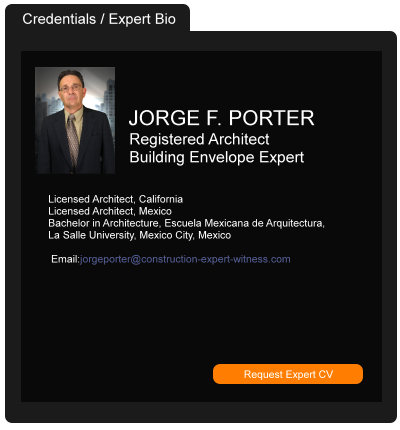Toolbox Talk Series Recap - The New Science of Jury Trial Advocacy
December 31, 2024 —
Douglas J. Mackin - The Dispute ResolverIn the November 21, 2024 edition of Division 1's Toolbox Talk Series,
John Jerry Glas discussed how construction lawyers should adjust their trial strategies in response to shifts in juror attitudes. Glas believes that jurors have changed in the last twenty years, with modern jurors being more reluctant than ever to be seen as a lawyer’s puppet. Instead, they simply want a lawyer to help them organize and wade through evidence without spinning it and without spoon-feeding it. Essentially, Glas believes that lawyers achieve better jury trial results if they acknowledge the paradigm shift in jury psychology and reinvent themselves in response by influencing jury deliberations without directly telling a jury what to do. Glas refers to this as the “Waiter Pivot” and recently published a
book on the topic.
Throughout his presentation, Glas discussed how construction lawyers can embrace the Waiter Pivot throughout a jury trial:
- Voir Dire: Lawyers make their first impressions on a jury during voir dire. As such, lawyers should avoid questions that make jurors feel judged or stereotyped. Instead, give the jurors credit and make use of the opportunity to begin framing their case. For example, Glas once repeated the word “specifications” or “specs” in every question during voir dire where his product liability case turned on whether or not the product deviated from specifications.
Read the court decisionRead the full story...Reprinted courtesy of
Douglas J. Mackin, Cozen O’ConnorMr. Mackin may be contacted at
dmackin@cozen.com
Senior Living Facility Makes Construction Defect Claims
November 13, 2013 —
CDJ STAFFMidland Meadows Senior Living, LLC has filed a petition for declaratory judgment in the U.S. District Court in West Virginia, claiming that the contractor who built the facility, Arcon Group Incl, made a variety of errors, leading to mold and lack of water in the dining room, but also that floors were improperly constructed, sump pumps were not installed, and that the company failed to properly insulate the buildings.
The lawsuit also names Arcon Group’s insurer, First Mercury Insurance Company.
Read the court decisionRead the full story...Reprinted courtesy of
Sensors for Smarter Construction – Interview with Laura Kassovic of MbientLab
November 17, 2016 —
Aarni Heiskanen – AEC BusinessI had the pleasure of interviewing Laura Kassovic, CEO and Co-founder at MbientLab Inc. We discuss how wearable technology and smart sensors can help on the construction site.
MbientLab is a technology company headquartered in San Francisco, California. It was started about four years ago by a team of engineers who are experts in sensors and machine learning. MbientLab develops wearable technology and also does manufacturing in the USA and Asia.
Read the court decisionRead the full story...Reprinted courtesy of
Aarni Heiskanen, AEC BusinessMr. Heiskanen may be contacted at
aarni@aepartners.fi
Claims Made Insurance Policies
November 04, 2019 —
David Adelstein - Florida Construction Legal Updates“Claims-made policies are common in the professional liability insurance market. They “differ from traditional ‘occurrence’-based policies primarily based upon the scope of the risk against which they insure.” With claims-made policies, coverage is provided only where the act giving rise to coverage “is discovered and brought to the attention of the insurance company during the period of the policy.” In contrast, coverage is provided under an occurrence-based policy if the act giving rise to coverage “occurred during the period of the policy, regardless of the date a claim is actually made against the insured.” “The essence, then, of a claims-made policy is notice to the carrier within the policy period.”
Crowely Maritime Corp. v. National Union Fire Ins. Co. of Pittsburgh, PA, 2019 WL 3294003 (11thCir. 2019)
The recent Eleventh Circuit Court of Appeal opinion in Crowely Maritime Corp. discussed the distinction between a claims-made insurance policy and an occurrence-based insurance policy. Professional liability policies are generally claims-made policies whereas commercial general liability policies are generally occurrence-based policies. While this opinion does not involve a construction matter, the case did concern the definition of a “claim” in a claims-made policy and whether such claim was timely reported to the insurer within the discovery period / extended reporting period.
Read the court decisionRead the full story...Reprinted courtesy of
David Adelstein, Kirwin Norris, P.A.Mr. Adelstein may be contacted at
dma@kirwinnorris.com
Second Circuit Clarifies What Must Be Alleged to Establish “Joint Employer” Liability in the Context of Federal Employment Discrimination Claims
March 14, 2022 —
Kevin J. O’Connor, Aaron C. Schlesinger & Lauren Rayner Davis - Peckar & Abramson, P.C.The “joint employer” doctrine has been used with increasing frequency by the plaintiffs’ bar to broaden the scope of target defendants in discrimination cases beyond those who would be traditionally regarded as the employer. This is true even in the construction industry, which has seen a rise in cases where general contractors or construction managers are being targeted when discrimination is alleged on a construction project, even when the GC or CM is far removed from the underlying events and had no control over the employees in question.
Until now, the Courts in the federal circuit which includes New York City (the Second Circuit) have been left to decipher a patchwork of case law to ascertain the scope and extent of joint employer liability in discrimination cases. This week, the Second Circuit Court of Appeals in Felder v. United States Tennis Association, et al., 19-1094, issued a comprehensive decision which provides a helpful summary of what must be pled and proven to broaden liability under the joint employer theory in discrimination cases.
Reprinted courtesy of
Kevin J. O’Connor, Peckar & Abramson, P.C.,
Aaron C. Schlesinger, Peckar & Abramson, P.C. and
Lauren Rayner Davis, Peckar & Abramson, P.C.
Mr. O'Connor may be contacted at koconnor@pecklaw.com
Mr. Schlesinger may be contacted at aschlesinger@pecklaw.com
Ms. Davis may be contacted at ldavis@pecklaw.com
Read the court decisionRead the full story...Reprinted courtesy of
Insurer Not Entitled to Summary Judgment on Construction Defect Claims
February 10, 2012 —
Tred R. Eyerly - Insurance Law HawaiiThe insurer unsuccessfully moved for summary judgment, contending it had no obligation to defend two related underlying construction defect cases. Amerisure Ins. Co. v. R.L.Lantana Boatyard, Ltd., 2012 U.S. Dist. LEXIS 2466 (S.D. Fla. Jan. 9, 2012).
� An engineering report noted design construction defects and deficiencies in visible, physical improvements at The Moorings at Lantana Condominium. In two lawsuits, The Moorings sued the developer, R.L. Lantana Boatyard ("RLLB"), and the contractor, Current Builders of Florida.
� Current Builders was insured by Amerisure. RLLB was named as an additional insured under the Amerisure policy.
Read the full story…
� � � Reprinted courtesy of Tred R. Eyerly, Insurance Law Hawaii. Mr. Eyerly can be contacted at te@hawaiilawyer.com
� Read the court decisionRead the full story...Reprinted courtesy of
House Bill Clarifies Start Point for Florida’s Statute of Repose
September 14, 2017 —
Lian Skaf - White and Williams LLPThe Florida legislature recently enacted a law clarifying when the ten-year statute of repose begins to run for cases involving “improvements to real property,” as that phrase is used in Florida Statute Section 95.11. House Bill 377 was signed into law on June 14, 2017 and took effect in all cases accruing on or after July 1, 2017. This amendment is significant to subrogation professionals evaluating when cases involving contractors and design professionals are time barred.
Read the court decisionRead the full story...Reprinted courtesy of
Lian Skaf, White and Williams LLPMr. Skaf may be contacted at
skafl@whiteandwilliams.com
ASCE Releases First-of-its-Kind Sustainable Infrastructure Standard
October 24, 2023 —
American Society of Civil EngineersRESTON, VA — The
American Society of Civil Engineers (ASCE) today released a first-of-its-kind standard, ASCE/COS 73-23: Standard Practice for Sustainable Infrastructure, which provides guidance for infrastructure owners to develop and implement sustainable solutions through a project's entire life cycle. It is a non-mandatory, performance-based standard designed for civil infrastructure ranging from transportation projects to water systems to the energy grid, developed over a period of five years involving a multitude of diverse stakeholders.
ASCE President Maria Lehman noted, "This is a transformational standard that for the first time will establish consensus guidance on how infrastructure owners should address sustainability in their projects. As of early September, there have been 23 confirmed weather/climate disaster events in the U.S. with losses exceeding $1 billion. That's almost one every week and a half. Sustainability and resilience are more important than ever. Infrastructure owners and designers have a responsibility to develop and implement practices that promote sustainability and long-term reliability of infrastructure projects, while also being cost-effective and collaborative with community stakeholders."
The standard complements existing ASCE standards and tools like the Envision rating system.
A discussion and examination of the ASCE/COS 73-23 standard will be held at the
ASCE INSPIRE 2023 Conference in Arlington, Virginia from November 16th-18th. Print copies of the standard will also be available for purchase at the conference.
Click here to register for the event and learn more about sustainable and resilient innovations in the civil engineering space.
To purchase the standard, visit
the link here.
ABOUT THE AMERICAN SOCIETY OF CIVIL ENGINEERS
Founded in 1852, the American Society of Civil Engineers represents more than 150,000 civil engineers worldwide and is America's oldest national engineering society. ASCE works to raise awareness of the need to maintain and modernize the nation's infrastructure using sustainable and resilient practices, advocates for increasing and optimizing investment in infrastructure, and improve engineering knowledge and competency. For more information, visit www.asce.org or www.infrastructurereportcard.org and follow us on Twitter, @ASCETweets and @ASCEGovRel.
Read the court decisionRead the full story...Reprinted courtesy of


































































